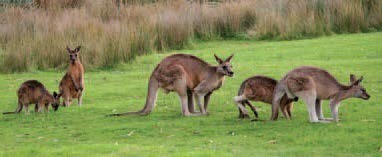Kangaroos Farts Might Smell of Success

By Samba Lampich
There’s nothing quite as off-putting as a pungent fart — be it from a beloved pet or mischievous sibling. And all that farting, burping and belching from cattle, sheep and other ruminants contain large amounts of methane, which is the most potent of the greenhouse gases (GHG). According to the Food and Agriculture Organization (FAO) of the United Nations, the total emission from global livestock is 7.1 Gigatonnes of CO2 equivalent per year, which represents 14.5% of all anthropogenic GHG emissions (FAOSTAT, 2014).
Unlike other ruminants, kangaroo farts have been known to contain little methane— about 80% less than cows — but until recently the cause has never been fully understood.
Sniffing Out Answers
Microbiologist Scott Godwin of Queensland Department of Agriculture, Fisheries and Forestry in Brisbane, Australia, and his colleagues investigated the microbes in kangaroos’ digestive tracts and published their findings in the March 13 issue of The ISME Journal.
Godwin collected the microbes found in the foregut of three wild eastern gray kangaroos and let them ferment in bottles alongside cow gut microbes. When most animals digest food the microbes in their guts creates carbon dioxide and hydrogen. However, animals like cows and sheep have other microbes called methanogens that create methane.
The researchers found some methane-making microbes in the kangaroo samples, but they also found other active microbes such as acetogens. These special microbes take in carbon dioxide and hydrogen and produce acetate, which becomes a source of energy for the kangaroos. Researchers said it smelled “like manure with a bit of vinegar and parmesan cheese.”
Now that the research has yielded answers as to why kangaroos produce little methane, the ideal next step would be to find out if implanting kangaroo microbes,
which included the acetogens, into livestock would reduce their methane production. This is turn would be help reduce global warming.
Vocabulary List/Glossary
- Anthropogenic
- Acetate
- Acetogens
- Fermentation
- Foregut
- Greenhouse Gas (GHG)
- Methane
- Methanogens
Factoids
- Scientists have developed a method for extracting methane from cow manure, cleaning and converting it into a biogas fuel that can be used as alternative energy to power the farm or sell.
- In 2012, U.S. greenhouse gas emissions totaled 6,526 million metric tons CO2 Eq. (EPA, National Greenhouse Gas Emissions Data, 2014).